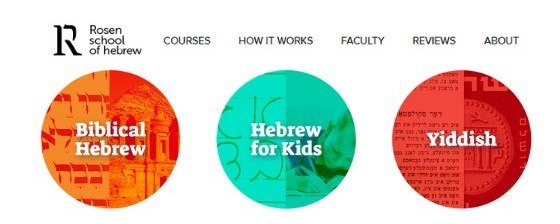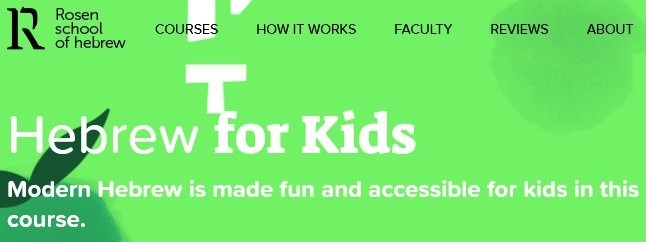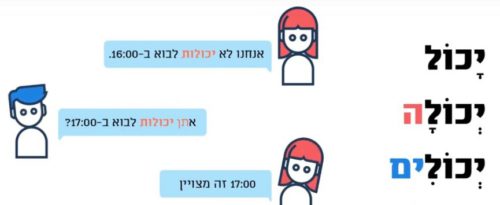Studies have shown that it is easier for children to learn a second language than it is for adults. It’s also a great skill to have either way, as being bilingual is becoming more and more useful as the years go on. Learning a new language can give your child a leg up and teach them valuable skills they can use later in life. Why not teach your child Hebrew for school or for fun? This is a great choice not just for Jewish people looking to connect back to their roots but for anybody who wants their child to learn a foreign language.
 Where to Learn Hebrew
Where to Learn Hebrew
There are many ways to learn Hebrew, both online and in a traditional classroom. The same resources that you would use to learn Hebrew may not work for your child, though. Luckily, there is a website with a course designed specifically for children.
The Rosen School of Hebrew is named for Aharon Rosen, a pioneer of Hebrew teaching in Israel. The books he wrote are still used to teach Hebrew to students today, and during his lifetime, he helped teach the language to many people.
This site has a curriculum designed by a group of highly passionate teachers. Their goal is to offer classes that are accessible to anyone, regardless of where they are in the world. You can learn everything from the comfort of your own home, at your own pace. They also use a “Hebrew in Hebrew” method of teaching, creating an immersive environment that allows students to pick up the language quickly and in a more natural way than simply learning grammar.
Adults can learn Modern Hebrew, Biblical Hebrew, and Yiddish from the Rosen School of Hebrew. There is also, of course, a Hebrew for Children course. All courses are live and entirely online. In addition to the video lectures, you will also have access to forums where you can discuss your classes with other students and reach out to professors in order to ask questions.
Who Will Teach Your Children?
When you take a class, you will learn from one of the 50 faculty members at the Rosen School of Hebrew. These are native Israeli professors who are passionate about sharing their language and culture!
Orna Zalmanov is one of the developers of the Hebrew for Children course and she also teaches courses in Modern Hebrew. She has been teaching for over 30 years and also works with the Israel Institute of Biblical Studies. She loves being able to see a student go from knowing absolutely nothing about Hebrew to being able to speak in full sentences and express themselves only months later. She has worked in high schools, both in Israel and the United States.
Shira Cohen-Regev is the other developer of the Hebrew for Children course. You can also find her teaching courses on Biblical Hebrew. Shira has been teaching for over 20 years. Not only does she create content and teach courses for the Rosen School of Hebrew and the Israel Institute of Biblical Studies, but she also teaches professional development courses to other teachers. She trains new Hebrew teachers as well. She loves the challenge of teaching online courses and believes in offering support to students one-on-one and in small groups in order to help them learn as best as they can.

Hebrew for Kids: Intro
There are 30 lessons in the Hebrew for Children course. It starts with the basics, just as the Adult Beginner Hebrew course does, but it uses language and subject matter that is more appropriate and understandable for young learners. The course uses games, cartoons, and pictures in order to teach children Hebrew while making it fun for them as well!
This course also moves slower than the adult courses, so don’t worry that it may be too much for your child. Where the adult course may teach many phrases in one lesson or go over verbal structures, the children’s course is more focused on learning simple vocabulary at a steady pace they can keep up with.
Lessons 1-10
The cartoon characters that will help your children learn through the course are Ram, Nira, and Robo. They will start off small, learning how to introduce themselves and how to say hello. The next lesson will add on to this by teaching them how to say “no”. With a few simple vocabulary words, they will be able to say “I am [name]”, “I am not [name],” “Are you [name]?”.
They will continue to add to their vocabulary as the lessons go on, learning home, class, car, and in during Lesson 3 and who in Lesson 4. It may seem small, but this will greatly expand the phrases and questions they can use! “Are you home,” “I am in class,” “Who is in the car?” are all examples of phrases your child will be able to say after only four lessons.
Vocabulary to talk about their family is another subject your child will learn. This is where they will start to learn about masculine and feminine words, using the pairs of mother/father and grandmother/grandfather. It is not an outright grammar lesson, but it will certainly help your child to understand the concept later down the road.
They will grow their vocabulary with of and mine in order to talk about possessions. They will also learn how to tell others where they live, by learning place names, where, and the verb to live.
Lesson 8 will teach them nice, street, and there. Your child will also continue to learn about masculine and feminine words by working with the verb “to live”. They will be able to converse even more after this, asking “Where do you live?” and answering “I live in [place].”
Lesson 9 will introduce your child to the concept of using parts of words to make up a whole word. After all that, they’ll review what they’ve learned so far before they move onto the next section of lessons.

Lessons 11-20
After their review of lessons 1-9, your child will dive back into learning more vocabulary. Next up is vocabulary related to school, such as desk, book, backpack, chair, etc. On and the will help them to discuss things even further, teaching them how to tell you where something is. “The backpack is on the chair”, “My book is on the desk”, etc.
The word and will help your child out greatly! Learning such a seemingly simple word can help them to create longer, more complex sentences. Thank you and here will also help them as they grow their vocabulary and become able to create more sentences from it.
Lesson 13 introduces more school-related vocabulary, in addition to words like television, money, is, isn’t, maybe, and only. “Maybe the money is on the desk”, “Robo isn’t in the car and Nira isn’t in class”. See how introducing just a few more words increases your child’s ability to communicate?
Lessons 14-16 continue to add to the school-related vocabulary. They will learn how to ask and answer the question, “What is in the school bag?”. They will learn a new verb to learn as well as vocabulary to discuss what classes they are taking, such as music, math, and Hebrew (of course!). Lesson, today, he, and she will enable them to further discuss their school day. “What lesson is today”, “Hebrew is today”, etc.
After this, your child will continue to learn more and more verbs. Up next is to walk and to run. Store, work, school, and party will help them to tell others where they are going. Where to and to will help them to piece things together in order to create sentences. “Where is he going”, “He is going home”, “She is running to work”, “He is walking to the store” are all things your child will be able to say by this point.
Lesson 19 is a review of lessons 11-18. Your child will be able to cover and piece together everything they have learned up to this point. Games, stories, pictures, matching games, and dialogues are all parts of the lessons and these will continue to be used in the review lesson. Your child will be learning and learning, all while being entertained.
Lesson 20 is “I have friends”. Your child will learn the masculine and feminine form of the word friend, as well as the plural friends. This won’t just teach them one word, it will introduce them to the concept of plurals as a whole! They will also learn guitar, bike, watch, and ball so that they can talk about some things they do with their friends. They will continue to use to in order to say to him, to her, and to me in their sentences.

Lessons 21-30
Lesson 21 continues to make use of to and also introduces nothing and but. It features an additional review of vocabulary that has been learned up to this point, using it in addition to the new words learned in the lesson to create sentences.
Lesson 22 asks, “What do you want?” and Lesson 23 gives the answer. Juice, boy, girl, please, candy, big, small, and the verbs to want and to give will all be learned in these two lessons. With the verbs as well as the words big and small, they will also continue to learn about masculine and feminine words. “What do you want?” “I want juice, please!”.
Lessons 24-26 are about learning how to say what you are doing. Traveling, writing, and reading will be learned in four different forms: masculine, feminine, singular, and plural. They will also add to their vocabulary words with movie, game, note, girls, boys, and now.
One thing to note about learning boys and girls is that your child will now be learning about the differences between plural masculine and feminine words, not just singular ones.
Lesson 27 will teach your child to know and to speak, as well as why and because. New and excellent will be used to help them further describe things. This is another lesson that includes a review of all the things your child has learned so far. They will read and play fun games in order to use everything they have learned up to this point.
Lesson 28 will teach your child about plural pronouns. We, they, and the plural you will all be taught. They and plural you will also help your child to continue to learn the masculine and feminine forms of words. More games and reading will be part of this lesson as your child continues to piece together all their vocabulary in order to create new sentences.
Lesson 29 is where your child will learn numbers. They will learn 1-12 so that they can start talking about the time and they will also learn how to tell someone their age. They will be able to ask someone how old they are and answer the question as well. Birthday and congratulations will join their vocabulary as well.
The final lesson will teach your child more verbs, to hear, to see, and to do. They will also learn how to combine to do with want. Vocabulary learned in all the previous lessons can be used with to do in order to create far more complex sentences than what your child could form back in Lesson 1. “What do you want to do?”, “I want to read a book, please”. “What are you doing?”, “I am walking to the party”. You will truly be able to see how far your child has come if you take a look back at what they could do in the first few lessons compared to now.
What Others Are Saying
Students who have taken courses from the Rosen School of Hebrew are impressed by how well-designed the program is. They have said that the teachers are “concerned for all students no matter what level” and that they “appreciate the one-on-one attention” offered by faculty members. They love that they can learn from native speakers, in an online format that is easy to follow. One student said that Shira Cohen-Regev (one of the developers of Hebrew for Children) is “a wonderful teacher” and that she is “very patient and very thorough”. It certainly seems like you and your kids will be in good hands when you take a course from this online school.
Help Your Kids Start Learning Now
The great thing about the Rosen School of Hebrew is that you and your child can take courses in Hebrew at the same time! Maybe you want to learn some for a family vacation, to speak with relatives in Israel, or just for the fun of learning a new language. Whatever the reason, learning a new language is great for kids and Hebrew is a fun and interesting one to learn.